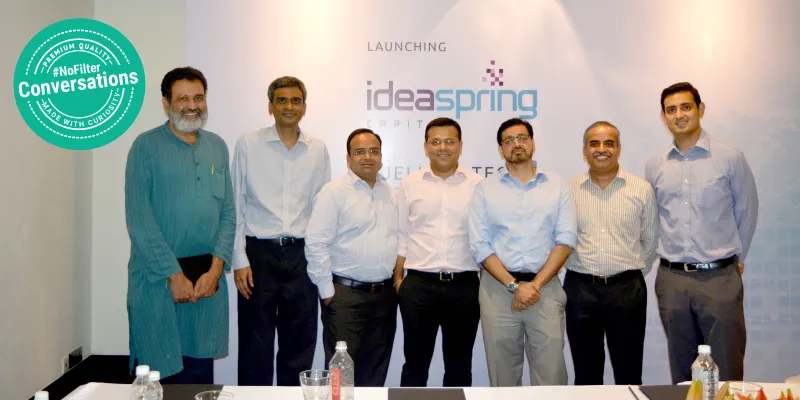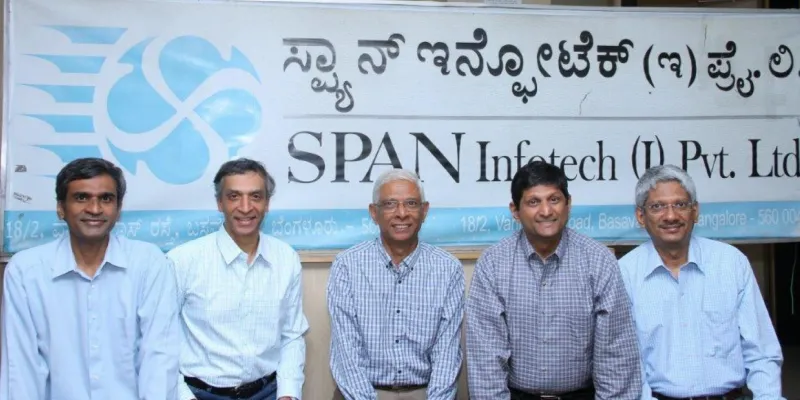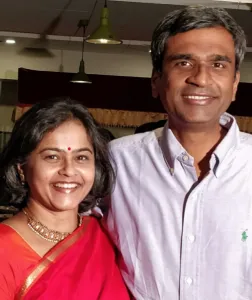Naganand Doraswamy on his journey from techie to entrepreneur and now investor
Like many of you tracking the world of startups, I too am curious about investment decisions: why does a particular company get funded vs the hundred others in the space who do not? Who are the investors out there? How are they thinking? What prompts them to invest? What are they like when the good times end? What is their motivation besides the IRR they must deliver to their LPs?

This never-ending curiosity led me to think that maybe you too are just as intrigued about what does go on in the mind of an investor. So here we are, trying to get a glimpse into their minds (at least as much as they allow us to and the extent that we can dig, and I promise you, we will dig hard!) and bring out unfiltered stories of investors.
Today, meet Naganand Doraswamy, Founder and Managing Director at IdeaSpring Capital.
Think of investors, and the first image that pops in your head is that of a polished individual who knows the trends, knows what they’re doing, and is clearly a cut above the rest. Now, let’s take a 360-degree turn as I introduce you to Naganand Doraswamy, more entrepreneur, less investor, a simple man clad in t-shirt and jeans and driving a Santro Automatic (which he believes is the most efficient car to drive in Bangalore!). He talks to you like he’s part of your tapri pe chai gang.

As I recall our conversation at my office in Bengaluru a fortnight back, I see before me a young man (he is 52, btw! we’ll come to the secret of his youthful looks in just a bit) brimming with energy.
Naganand started his journey as an engineer, joined PSI India as a software engineer, made his way into entrepreneurship, not once but multiple times, before moving onto the next leg of his journey – as a venture capitalist. In doing so, he transitioned from being a technology professional to a management professional and a human resources manager.
“Suddenly, I was put in a place where I had to manage people who are very good, very strong,” he recalls.
The transition, challenging as it was, served him well to become an investor who understands and propagates the role of an investor to be a mentor and an advisor to entrepreneurs.
“The first year of my career as a manager was an absolute nightmare, so much so that my manager (Nanying Yin) said, ‘Look, you can't be a manager. I’m going to take you out.’ I said no, you cannot because this is going to kill me for the rest of my life. You give me six more months. If I don't improve, then you remove me.
“He said, ‘Okay, do it’. He gave me a mentor named Gary Vacon. Gary had sold his company for $100+ million in early 1990s. So, he started attending my meetings and after every meeting, he would take me out for lunch. And he told me, ‘The first thing you have to change is you have to listen more. The biggest problem with you is you tend to complete somebody else's sentence. You are very smart. You might think very fast, but always let others speak first. You (must) always listen. As a manager, your first job is to listen. What is your hurry? Slow down.”
It was advice he took to heart, realising perhaps, that his background had scarcely prepared him for his new avatar.
The early days...
Like many intelligent, hardworking Indian youths in the 1980s and ’90s, he had limited choices when it came to careers - it had to be either engineering or medicine. Born and bred in Bengaluru, he graduated from UVCE with a BS in Computer Science. At the time, Naganand was fascinated by the world of technology and inducted early into Processor Systems, India.
At PSI, he was very excited as he was exposed UNIX operating systems where a team of 3 fresh graduates under the guidance of a manager embarked on porting AT&T 3B2 processor onto an in-built Motorola 68030-based board. He followed up this stint with a Master’s in Computer Science at Virginia Tech in the US. His older brother, Ananth, sponsored him for a part of the first semester until he got an assistantship.
Involved in pioneering work in technology – TCP-IP stack for Windows NT, writing an NFS server to export all DOS files as NFS to UNIX systems, writing the first implementation of IP security on the client side, and publishing a book called IPSec – Naganand worked with FTP Software till business suffered when Microsoft came up with its TCP-IP Stack. This was followed by a stint at Bay Networks, a competitor to CISCO, where he went on to become the working group Chair in a couple of areas in the IETF (Internet Engineering Task Force) that defined next-gen networking protocol and architecture, amongst other things.
I ask him if he was bright right from the start, both at school and in his career. Naganand says he doesn’t think so.
He humbly describes himself as hardworking and feels that most people are born with a basic, reasonable amount of intelligence; success comes from how hard one works with this intelligence, getting the right breaks, and making the right professional choices.
Interspersed with his professional journey are glimpses of a childhood that taught him the importance of self-sufficiency, the ethics of hard work and persistence. Living with cousins – a family of 13 in an 800-square-foot house with one bathroom – Naganand is inspired by his mother who would wake up early to cook for everyone, learnt to drive a Luna at the age of 40, and continues to live independently.

Surrounded by bright siblings and cousins ranging from a scientist at ISRO, a trader from New York University business school, to IIM alumni, mediocrity was not an option. He learnt to help his mother in the kitchen every morning, which has served him well as he still meanders into the kitchen during weekends.
What every thoroughbred entrepreneur should be
Personal values and principles have been Naganand’s mainstay, which he continues to drum into his children. Driving his Santro, a model discontinued several years back, he is practical about his expenses, and that of his children.
He believes that while it is important to have a comfortable home and amenities, there has to be a limit on desires, and relationships and humanity must be front and centre.
Health, happiness and common sense are more desirable than materialistic acquisitions. He also feels every person should set a limit of how much he wants to earn and save, accomplish the goal, and then set goals like helping others, interacting and learning from interesting people, and giving back to society.
Having started and participated in multiple entrepreneurial ventures, Naganand confides to me that not all were successful. In fact, his bigger challenges have proved to be his best training grounds. Recounting examples from his own life as an entrepreneur, he has taken time to reflect and distill what really brings out the true mettle of a thoroughbred entrepreneur.
Confidence to face and overcome tough times
Like the time he was part of PhotonEx, which had around 15 PhD holders and raised $150 million only for the product they created – long-haul optical transmission systems to send 1.6 terabytes of traffic to AT&T and other telecoms – to be made redundant when the telecom sector imploded. Setbacks like this, according to him, strengthen you because they teach you how to survive with confidence.
Learn from others
Another lesson he learned was that your detractors can provide to be your mentors in disguise.
“Tim Barrows, the co-founder of Matrix Partners and my mentor, told me, ‘You do a startup and I will support you.’ I took this idea to him, and he said, ‘No this will not work, I will not support it because it requires to be sold to three segments, which are disparate.’ I was very unhappy at that time as with your brash thinking, you think you can do it. I felt let down then, but today with a lot more maturity now, I know he was right. In fact, by not funding the idea, he potentially saved me 4 years of hard work which would probably not have yielded financial success. Tim is hugely supportive on what I am doing today.”
That experience has also taught him to judge his portfolio companies harshly if they fail i.e. not have a financial outcome.
“I have failed myself, and realise that it is part of the journey. I started a venture which nobody was investing in and I had run out of money. I remember going to (Gururaj) Desh Deshpande (a highly respected entrepreneur) and told me something simple that has stayed with me forever:
‘Irrespective of the background, the goal of an entrepreneur should be to increase revenue X number of times.’”
After nine months of trying to make his startup work in the US, Naganand and his family returned to India but working for someone else was not an option. On the specific advice of Desh Deshpande, Naganand re-joined his cousin’s company which he had co-founded – SPAN, an outsourced product development company – despite being a product man and not a services guy.

As he puts it, “It doesn’t matter where you are, who you are, what you do; what matters most is as a founder, did you take the company to the next level? We went from 150 people to 750 people in two years and grew 5x in five years.”
Be open to inputs
In response to my question, “What I see is that you are very open to taking suggestions, many people don’t, right?” Naganand is quick to point out it is important to not only listen, but also implement relevant suggestions; in short, internalise them.
Education imparts structure and processes in thinking
“Not everyone is at the level of Steve Jobs or Bill Gates. I knew I was not that (at) level. People say that these guys dropped out of school, so entrepreneurs can drop out,” he points out.
Naganand dismisses these examples, calling them “guys who are one in a billion”. He would rather place his bets on entrepreneurs who have learned through the system, and get the right education because that process too teaches you a lot – it also helps you self-evaluate your strengths. “Dropping out of school to start a start-up should not be a fashion. You do it if you have already started something when in school and you are seeing traction.”
I wonder aloud, “Have you figured it all out?”
Naganand thinks he has…he describes himself as a person who thinks well, is reasonably good to others, and is physically fit.
I think a little more about having the ability to listen and be open and recall Naganand’s moderating skills at the two panel discussions that I was a part of. His expertise at handling the panels was commendable.
“You were the most self-effacing and amazing moderator who gave all us participants so much space,” I tell him.
Naganand responds with what I have begun to recognise as his signature philosophical attitude.
“Look, I am not here for people to come and tell me, ‘Oh, you are good.’ I have passed that phase in my life. I am very happy, I am content, (which is) not to say I am not trying to achieve bigger things, but that journey should be enjoyable. I don’t want to do things that I don’t enjoy anymore.”
That does not mean that entrepreneurs should not be financially ambitious or aim higher; in fact, Naganand advocates having lofty financial goals. In fact, he trusts entrepreneurs who respect money and its importance in creating a safe and stable future for their family and their business.
I agree with him. At an intrinsic level, because we all come from middle-class backgrounds, we have been raised with good values. Validation of our success comes from our financial health.
So, exiting and selling businesses is fine as long as organisational interests are safeguarded. Like the time when SPAN evoked interest from Norwegian company EDB in 2007 after having grown to 780 employees. EDB (now EVRY) saw the high potential of the outsourcing business and wanted to partner with SPAN. Initially, Naganand and his cousins – the founders – were not interested in the offer. When EDB sweetened the deal with a 51:49 partnership and a 50:50 revenue sharing based on their achievement of EBITDA target, the founders agreed. The exit was planned in such a way that all founders stayed committed to the firm until 2014.
The transition from entrepreneur to investor

Post-2014 is when Naganand started thinking, what next? His finances were secure, and his wife Roopa, a successful corporate lawyer by profession, is now on her own entrepreneurial journey with a B2B platform for lawyers called ‘Lawshram’ to scale their practice virtually.
Despite his love for entrepreneurship, Naganand realised he no longer had an idea he felt passionate about, demanding at least a four-year commitment, and a work week of 60 hours or more. He also realised he had learnt a lot that he could pass on to others across his 18 years as an entrepreneur.
And the final nudge came from the realisation that there was little focus on very early-stage funding for enterprise startups in India, a personal passion of his.
And that was the genesis of IdeaSpring Capital.
The initial thought was to not only fund startups but also provide assistance and space for their portfolio companies for a period of ~18 months. The belief was that it took about 12-18 months to get traction in the enterprise startup space. This plan evolved as investing in space didn’t seem like a great idea. Today, IdeaSpring, with its core team (besides Naganand, Arihant Patni, Suryaprakash Konanuru, Deepak Agrawal, Srinivas Prasad) plans to invest in 13-15 early-stage enterprise startups and works very closely with all its investee companies in the first 12-18 months of their journey.
Raising funds was not difficult when the right people were targeted – focused entrepreneurs who were interested in the enterprise startup space.
Despite zero experience in being an investor, Naganand calls this new chapter “fun”, as he is learning on the go. IdeaSpring has been visualised to provide early-stage funding to enterprise startups – more specifically provide Rs 3.5 crore each to about 15 companies with the idea that these startups should be given the time and breathing space to grow, and the investment will grow as these companies grow.
Hence, while the seed stage investment will be around Rs 3.5 crore for around 15 companies, another Rs 50 crore will be allocated to 10 startups who make it to the next stage.
“We are running IdeaSpring like a startup; when someone calls me an investor I say, ‘Please don’t call me an investor, call me your partner.’”
This is proven by the fact that Naganand has also brought in an external Investment Committee (IC) comprising Sanjay Anandram, Ravi Gururaj and Sharad Sharma to assist startups along with the three at IdeaSpring.
What exactly is IdeaSpring’s philosophy?
“I jokingly tell my entrepreneurs that we do more work to present you to our IC than you do to present to us. One of the reasons for the external committee is because we said that this fund is about supporting entrepreneurs. This fund is not about giving the money and putting up your legs and having a call once every three months, giving gyaan saying do this and walk away. I have been an entrepreneur for 18 years, and I want to keep on having an entrepreneur mindset.”
How does this get implemented?
“Our culture is that whenever an entrepreneur calls, pick up the phone, don’t say I don’t have time; talk to them on a weekly or bi-weekly basis, meet them every month face-to-face, ask them for an MIS report as the discipline is critical. One thing I have learned in life is without discipline nothing works. Be humble, be nice but be firm,” he explains.
I am a bit sceptical, “Do the entrepreneurs follow this?”
Naganand says unequivocally, “I tell them, if you want to work with us, we will give you all we have, but we have some expectations too. This is because the outcome is determined by different factors – certain tenets of what is required to build a successful company; we are very strict on governance, so we give a template to all our entrepreneurs saying we need quarterly reports. Get a company secretary from Day 1, we need your finance person and Company Secretary from Day 1 - without that we are not going to fund (you).”
This sets off a flurry of questions…
Are you the first investor in your companies?
“In most cases, we are.”
How do you get these deals?
“Through our IC, through contacts we have been in the industry.”
When did you start the fund?
“At the beginning of 2016.”
How many companies have you invested in?”
“Now nine, and six done, three-term sheets out; only after you write a definitive document is when we approach you, even as we speak, one of the companies is raising the next round, and another company will earn $2 million to $2.5 million in revenues this year.”
These accomplishments have not come easily; they have entailed 70-80 hours working with the companies, reaching out to contacts; strategising, meeting, and so much more.
I am curious to know what ‘stage’ he is in mentally, as an investor. His response is prompt: “I don’t know.”
It is an honest answer since Naganand is still unsure how the entrepreneurs being funded will fare. He is clear that he is passionate about helping the entrepreneurial ecosystem and giving money back to the LPs. He wants to wait for the first round of funding to fructify into successes, and maybe after two years, would be in a better position to showcase their achievements.
Shedding light on how the venture space operates, Naganand explains that in the worst case scenario, if the fund closes or sells it back to a secondary and gives the money back, if there are no monies then shares can be transferred directly to investors.
Reaching the end of the interview, I ask for some closing comments from Naganand the investor: he is clear he sees himself as someone who provides perspectives and gives inputs but is not an advisor to entrepreneurs. He would look for compatibility of thoughts and approach, rather than unnecessary flattery or praise from entrepreneurs. But most importantly, he wants his companies to succeed and make money.
Success, to him, is not only dependent on execution, but also on luck: he believes there is a 40 percent dependency on the market and timing. Speaking from personal experience, Naganand looks for persistence and is undaunted that two out of his three entrepreneurial stints did not fructify. As he says, “The third one worked, and I am happy where I am.”

Signing off on a slightly philosophical note, he says, “Money cannot buy health or happiness or common sense, but you need a certain amount of wealth to be happy. Define what is important, and then stick to it. Every person has their own operating point. You are most efficient, productive and happy once you figure this out. To me, what is important now is to interact with interesting people so you can learn from them and by associating one-on-one with like-minded people.”







